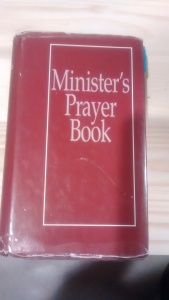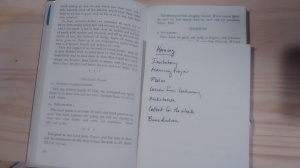Note: what follows is an adaptation of an outline written in Concordia Pulpit Resources this quarter by my friend and colleague, Dr. Korey Maas, who’s now a history professor at Hillsdale College.
There is very little that’s surprising to us in this parable from Jesus today. Like a fable from Aesop, the moral of the story is clearly and simply stated by the one who tells the parable, lest one risk misinterpreting here. Unlike Aesop, Luke’s explanation comes not at the end but is presented up front, right at the beginning: the Christian “ought always to pray and not lose heart.” Again, this is not a surprise to us. We’re familiar with other Scriptures encouraging us to “pray without ceasing” (1 Thess 5:17) But the context of this this parable and the persistent temptation it speaks to, serve to emphasize our need of continually hearing both the Law and the Gospel reiterated for us today. We can be assured that rather than lose heart, we can pray with confidence for God’s justice.
I mentioned a persistent temptation among us and that temptation is to lose heart. Our Gospel reading today speaks specifically to this anxiety among us about the end of all things. We have to go back to the previous chapter to see the context but Jesus tells this parable this morning in response to a question from the Pharisees when they ask, “When will the kingdom of God come?” (17:20) And Jesus tells them that the kingdom of God is not coming in ways that can be observed. And even to the disciples Jesus then says, “The days are coming when you will desire to see one of the days of the Son of Man and you will not see it.” (17:22) The Pharisees want to see the day of the coming kingdom. The disciples want to see it too. My guess is most, if not all of you want to see that day come as well. Believers look on the world as it is and see all the places where the kingdom of God has not yet come, where God’s ideal has not been realized. Even unbelievers recognize there is no justice and see it as proof that God is either not strong enough or good enough and therefore, if He exists at all, is not worth trusting. Waiting for the kingdom of God to come cause us some real anxiety and can tempt us to lose heart.
We see nothing but hints of the coming end of all things. “Wars and rumors of wars,” nations rising against other nations, “famines, earthquakes.” Perhaps we can add broken political systems and broken government to that list. In the midst of these kinds of rips in the fabric of the good creation, we’re encouraged to continue to pray as we’re taught, “Thy kingdom come”—and yet it feels like we pray to no avail; God’s kingdom has still not yet come.
Injustice is everywhere and our daily experience of it as we wait for Christ to come and set all things right will further tempt us to cease praying and to lose heart. The example Jesus gives is this widow who has to persistently petition the judge, “Give me justice!” So, add to all of that international and national tension we just mentioned, a daily ring-side view of injustice. Why won’t the insurance company pay? They paid last time. How could she possibly have lung cancer, she’s never smoked? How can the judge have possibly decided to let the children stay with him? We can be like the widow here asking the Lord to give us justice, for a change. It is difficult not to lose heart.
And nevertheless, we can still pray with confidence because of God promise to answer injustice with justice.
The widow in Jesus’ parable understood this well. She certainly knows injustice. She has experienced it, even from the very person who is supposed to be dishing it out. But this judge neither fears God nor respects man. By the way, this might seem like a description of impartiality to our modern secular world but this phrase, “neither fearing God nor respecting men,” is a mark of an evil person. So, this judge has not done what he is supposed to do and yet the widow keeps coming, keeps bothering, we might say badgering him with her case until the very act of her coming to him, pressing him to make her case right, forces the judge to act. She doesn’t despair. The squeaky wheel gets the oil. And so she squeaks and squeaks and squeaks until the judge decides her case. And Jesus uses her as a positive example here. If an unrighteous, let’s just call him what he is, if an unfair, bought judge knows how to dispense justice, at least eventually, how much greater then, your heavenly Father who has promised you to make it right!
Certainly, God will give justice to His own, to His elect. “I tell you, he will give them justice speedily.” The problem remains that we still don’t know when, or I should say how much longer things will be without God dispensing justice. But God has promised at act. God’s promise that he will act doesn’t allow for doubt that He will act or even despair that He hasn’t yet acted. The woman kept coming to a judge who had not promised to act. How much more confident then, can we be to bring our requests to the righteous Judge who has promised to answer. This is why we pray.
I had a conversation this week about this very question, why should Christians bother to pray? God already knows what we need. Right? So why pray? We pray firstly because God tells us to pray. God tells us to ask of Him like a child asks of his or her father. God delights to hear our prayers. So that’s the first reason. The second is because in praying, we are aligning ourselves with God’s will. Just think back to the Small Catechism’s explanations about the Lord’s Prayer. “Thy kingdom come.” “The kingdom of God certainly comes even without our prayer but we pray in this petition that it may come among us also.” In another place Luther boldly described prayer as rubbing God’s promises in His ears. That’s certainly the impression we get from the widow in Jesus’ parable today and why we can pray with confidence in God’s promised justice.
God’s sure promise is that he will give justice. This is what the widow is praying for. But if we are to pray confidently in God’s justice, we need to pray not in the way of the Law but in the way of the Gospel. I know that a legal view of justice would be some measure of fairness or even giving what one deserves. Luther struggled with this idea of God’s justice. If this is the way God deals with sinners, sinners deserve condemnation from a fair God. But Luther rejoiced to discover again that God’s justice is bigger than that. God’s justice is His work to justify sinners, to make broken, imperfect people right with Him through the mercy of Jesus on the cross. The widow prays, give me justice. To pray this prayer aright is to pray, give me not what I deserve, or what I think I’ve earned but give me that justice that Christ has earned for me. Give me what You’ve promised, O Lord, solely on account of Christ Jesus.
The temptation, and I know it well, is to see things not through God’s eye, through the cross of Christ, but through our own eyes where justice delayed is justice denied. Though the fullness of God’s kingdom has not yet come, the justice of God has been give already, on the cross. And as we participate in the feast of His kingdom, the kingdom comes for you in this foretaste. Don’t lose heart, dear saints of God. Your prayers are heard and answered. The righteous judge has already fulfilled His promise, and He will continue give justice. It’s a promise. Amen.
 A number of people have asked how I use Doberstein’s A Minister’s Prayer Book. The book typically comes with a ribbon marker and that’s it. I use that ribbon marker in the lectionary section. I also just took a sticky bookmark tab and marked the psalms table.
A number of people have asked how I use Doberstein’s A Minister’s Prayer Book. The book typically comes with a ribbon marker and that’s it. I use that ribbon marker in the lectionary section. I also just took a sticky bookmark tab and marked the psalms table.